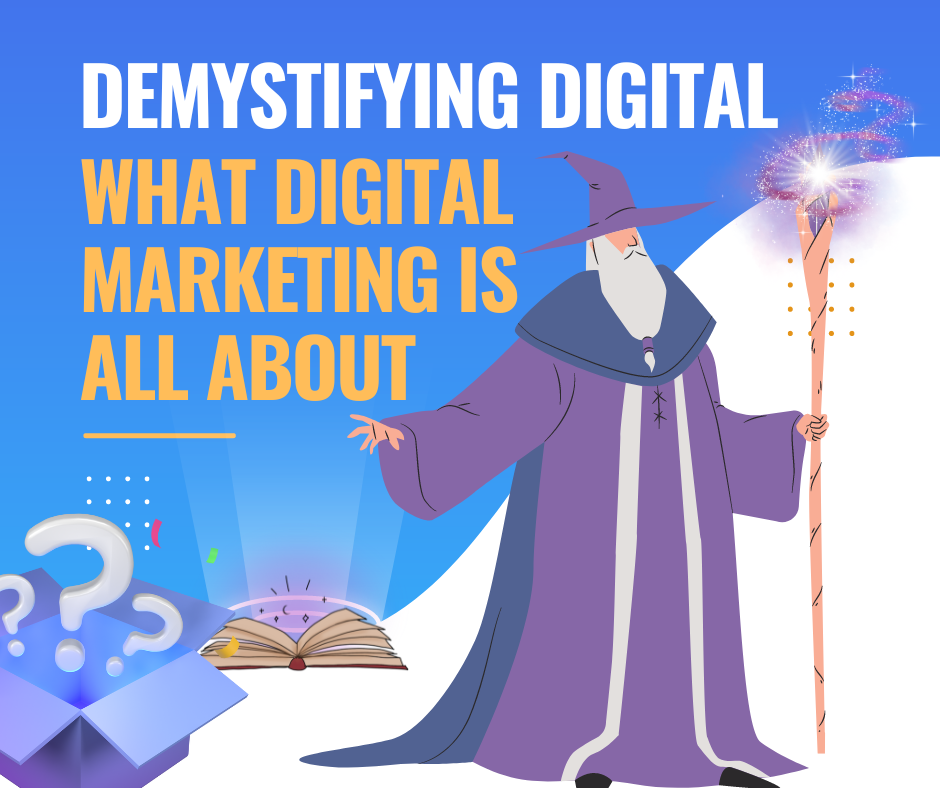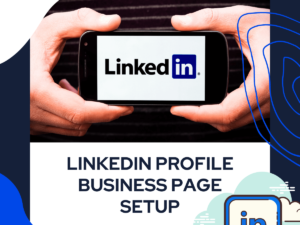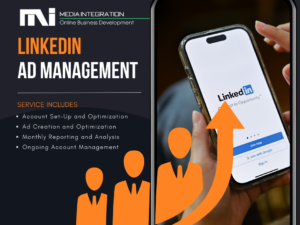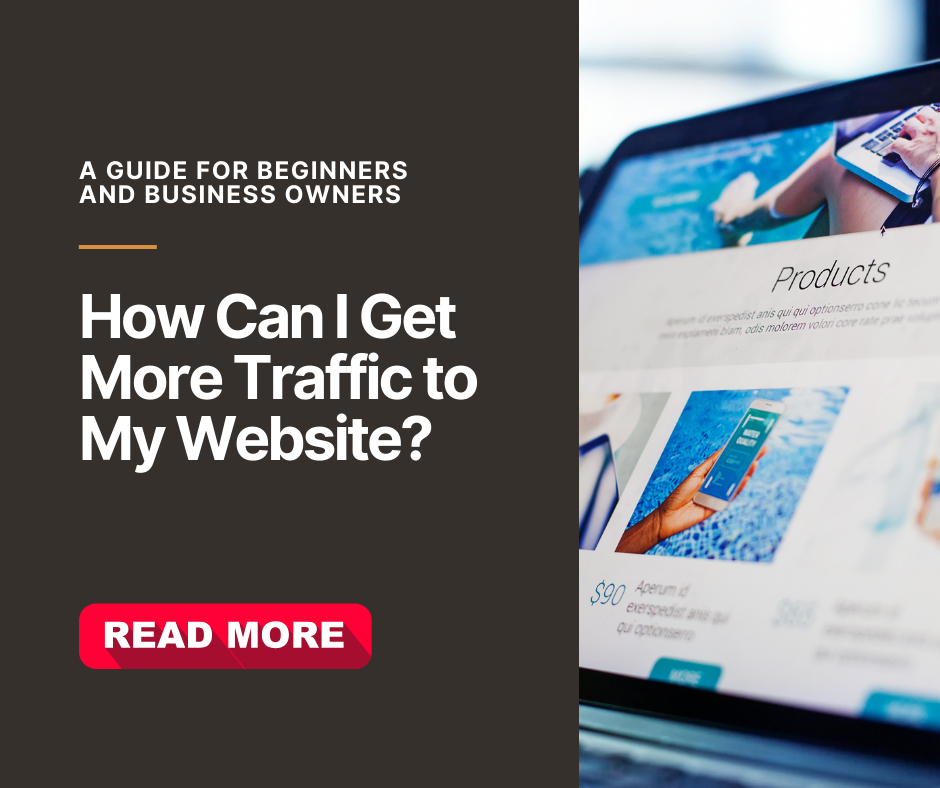Hello, intrepid digital explorers! Ever found yourself pondering, “What on earth is digital marketing?” Well, if that’s the case, you’ve stumbled upon the perfect pit-stop. Today, we’re embarking on an exciting expedition into the seemingly infinite universe of digital marketing, ready to shed some much-needed light on its numerous nooks and crannies.
From breaking down those pesky jargons to explaining the ins and outs of various strategies, we’ve got your digital marketing queries covered. Picture this journey like a deep dive into the mysterious digital marketing ocean, where the sea creatures are different tactics and the sunken treasure is the key to unlocking your brand’s potential. Exciting, isn’t it?
Now, I know the digital marketing world can seem a bit daunting, like standing at the foot of a colossal mountain or gazing into a starry night sky. There are countless strategies, platforms, metrics, all jostling for your attention. It can feel overwhelming, like trying to figure out how to build a spaceship to Mars!
But fear not! That’s why we’re here. Consider this your step-by-step guide, your map leading the way, or if you like the interstellar analogy, your very own mission control, guiding you through the digital marketing universe. We’re all about breaking things down, simplifying the complicated, and making the intimidating seem, well, not so scary.
So, are you buckled up and ready to embark on this wild ride? Whether you’re a small business owner, an eager entrepreneur, a marketing newbie, or just someone curious about the buzzword that is “digital marketing,” this journey has something for everyone.
Alright, folks, it’s time to fuel up our spaceship, cast off the moorings, and set sail. Here’s to unravelling the mysteries of digital marketing, one concept at a time!
What Digital Marketing is All About
Alright, so you’ve probably heard the term ‘digital marketing’ thrown around more times than you can count. It’s become as ubiquitous as morning coffee and rush hour traffic. But what does it really mean? Let’s break it down to its core.
At its most basic, digital marketing is all about using electronic devices or the internet to market your products or services. Think of it as traditional marketing’s tech-savvy younger sibling. Instead of billboards, we have banner ads; instead of flyers, we have email newsletters; and instead of TV commercials, we have YouTube videos.
Businesses big and small are harnessing the power of the internet and using platforms like social media, search engines, email, and their own websites as digital soapboxes. They’re using these platforms to shout from the digital rooftops about their products, services, or causes. The goal? To connect with you, me, and everyone else tapping away on their laptops or scrolling through their smartphones.
Sounds simple enough, right? Just swap out the physical for the digital, and voila – digital marketing. But hold onto your hats, because that’s just the tip of the iceberg. The digital world is vast, and the possibilities for marketing within it are almost infinite.
Let’s think about social media for a moment. It’s not just about posting a cool photo or a clever tweet. It’s about engaging with your audience, responding to comments, managing your brand reputation, targeting specific demographics with ads, collaborating with influencers – the list goes on.
And then there’s SEO – or Search Engine Optimization. Ever wonder how Google decides which websites appear first in your search results? That’s SEO in action. It’s a whole world of keyword research, backlink building, and content optimization, all aimed at making a website more attractive to search engines.
Let’s not forget email marketing, content marketing, affiliate marketing, mobile marketing – I could go on, but you get the picture. Each one is a piece of the digital marketing puzzle, offering its own unique advantages and challenges.
So, in a nutshell, that’s what digital marketing is all about. It’s not just about broadcasting a message; it’s about engaging, communicating, and building relationships. It’s about using technology to meet people where they are – online – and offering them value in return for their attention. And as the digital landscape continues to evolve, so too does the exciting world of digital marketing. So buckle up and enjoy the ride!
Digital Marketing – The Shift From Traditional Marketing
Oh boy, if you’re a history buff like me, then you’re going to love this trip down memory lane. We’re journeying back to the ‘good old days’ when marketing was all about print media, television, and radio. Picture Don Draper from ‘Mad Men,’ crafting persuasive messages to be broadcasted far and wide in the hopes of grabbing the audience’s attention.
Newspapers and magazines were overflowing with colorful full-page ads. Radios blared catchy jingles that had us humming along. And don’t even get me started on TV commercials – those mini-dramas that played out in between our favorite shows. These were the staples of traditional marketing, and for a time, they ruled the roost.
But then, the internet strolled into the scene, and the marketing world was forever altered. This wasn’t just some shiny new toy or a passing fad. The internet was – and is – a game-changer on a global scale.
Suddenly, we weren’t just consumers of content; we were creators, too. We didn’t have to wait for the morning paper to get our news, or tune in at a specific time to catch our favorite shows. Everything was at our fingertips, available on-demand, 24/7.
So, how did marketing adapt to this digital revolution? By evolving into what we now know as digital marketing. This wasn’t just a change of platforms; it was a paradigm shift. Instead of one-way communication – from businesses to consumers – we now had two-way, interactive exchanges.
With digital marketing, businesses weren’t just talking at their audience; they were conversing with them. Think about social media, for instance. Companies can post a new product announcement on Facebook or Instagram, and customers can comment, ask questions, and even share the post with their friends. It’s all happening in real time, breaking down the barriers and creating a sense of community around the brand.
Email marketing is another great example. Remember when businesses had to rely on snail mail for sending out catalogs or promotional offers? Now, they can send personalized emails straight to your inbox, complete with product recommendations based on your browsing history. Talk about catering to your audience!
And the best part? All this interactivity and personalization isn’t just good for customers; it’s great for businesses too. They get real-time feedback, can adjust their strategies on the fly, and build stronger, more meaningful relationships with their customers.
So, as you can see, the shift from traditional to digital marketing isn’t just about swapping billboards for banner ads. It’s a fundamental change in how businesses and customers communicate. It’s a brave new world of possibilities – and we’re just getting started!
Next, let take a look at the key components of digital marketing and how it all fits together.
Key Components of Digital Marketing
So, what ingredients do you need to whip up a successful digital marketing strategy? Here are a few:
- Search Engine Optimization (SEO): Want to appear on the first page of Google? That’s where SEO comes into play.
- Content Marketing: In the digital world, content is king. Powerful content can engage, inspire, and, most importantly, convert.
- Social Media Marketing: With billions of users worldwide, social media platforms are a gold mine for businesses.
- Email Marketing: It’s one of the oldest forms of digital marketing, yet it still packs a punch!
- Paid Advertising: Pay-per-click, display advertisements, social media ads – the list goes on.
- Analytics: Last but not least, understanding your performance is key to improving your strategy.
Why Digital Marketing Matters
I see that thoughtful expression on your face, that slight crinkle of the brows, and I know what you’re thinking. You’re asking, “Alright, this digital marketing stuff sounds pretty cool, but why does it matter? Why should I hitch my wagon to this digital star?”
Well, my friend, that’s an excellent question. Let me tell you, the power of digital marketing lies not just in its ability to connect businesses to a broad audience, but also in the quality of those connections. It’s like having a superpower that allows you to not just reach people but also resonate with them. Let’s break it down a little further.
First off, let’s talk scope. The internet is vast, like mind-bogglingly enormous. It’s like an endless ocean, teeming with potential customers. With digital marketing, you can cast your net far and wide, reaching out to people across different regions, demographics, and interests. Whether you’re a local bakery looking to attract more footfall or a multinational corporation aiming to boost global sales, digital marketing has got you covered.
Next up is measurability. One of the biggest advantages of digital marketing over traditional marketing is its ability to track and measure results. With tools like Google Analytics, you can monitor your campaigns in real time, see what’s working and what’s not, and tweak your strategy on the go. It’s like having a digital crystal ball that lets you predict and shape the future of your campaigns.
But wait, there’s more! Digital marketing isn’t just about bombarding people with ads; it’s about delivering personalized experiences. Thanks to data and analytics, you can tailor your messages to meet your audience’s specific needs and preferences. It’s like being a digital tailor, crafting bespoke suits for each customer.
Finally, let’s not forget about interaction. Digital marketing allows for real-time interaction with customers. Whether it’s responding to comments on social media, resolving issues via live chat, or engaging with customers through email marketing, digital platforms offer multiple avenues for direct communication. It’s like hosting a never-ending party where you get to mingle with your customers, hear their thoughts, and build relationships.
So there you have it. Digital marketing matters because it offers a level of reach, measurability, personalization, and interaction that’s unmatched by traditional marketing methods. It’s like trading in your old bicycle for a sleek new sports car. Sure, both can get you from point A to B, but the ride is a whole lot smoother and faster with the sports car. And in the fast-paced world of business, who wouldn’t want that?
Creating a Successful Digital Marketing Strategy
Now that we’ve established why digital marketing is so darn important, let’s chat about crafting a winning strategy. Just like any epic adventure, your foray into digital marketing needs a solid game plan. Otherwise, it’s like trying to hit a bullseye with a blindfold on—pretty tricky, right? So, let’s lift that blindfold and plot a course towards digital domination!
But wait a second! Before we begin mapping out our digital quest, we need to know where we’re going. So, our first pit stop is “Setting Clear Goals.”
You see, every successful marketing strategy starts with well-defined objectives. They’re like the shining lighthouse guiding our digital ship through stormy waters. Want to boost brand awareness? Increase sales? Drive traffic to your website? Great! Whatever your goals, make sure they’re clear, achievable, and most importantly, align with your overall business objectives. That’s your North Star, folks!
Now, with our goals set, it’s time to get to know the folks we’re trying to reach. Yes, you’ve guessed it, our next stop is “Understanding Your Audience.”
Think of it this way. If your goals are the ‘what,’ then your audience is the ‘who.’ They’re the lifeblood of your digital marketing efforts. But it’s not enough to just know who they are. You’ve got to understand their needs, their pain points, their aspirations. You need to speak their language, share their values. It’s about creating a connection that goes beyond the superficial—it’s about building a bond.
Finally, now that we know our goals and understand our audience, we’re ready to choose our weapons…err…I mean channels. Welcome to “Choosing the Right Channels.”
Think of digital channels like tools in your marketing toolbox. You’ve got social media, email marketing, SEO, PPC—the list goes on. But here’s the kicker, not every tool is right for every job. You’ve got to choose the right one for your specific goals and audience. It’s like using a hammer to drive in a screw. Sure, you might get it in there eventually, but wouldn’t a screwdriver be a lot more efficient?
So, there you have it, the three pillars of a successful digital marketing strategy—clear goals, understanding your audience, and choosing the right channels. Follow these steps, and you’ll be well on your way to digital marketing stardom!
Digital Marketing Tools and Platforms
Now that we’ve got our goals sorted and have a keen understanding of our audience, let’s dive into the fun stuff – the gadgets and gizmos of the digital marketing world. Much like how Batman has his Batbelt, digital marketers have their own suite of super tools. Intrigued? Let’s swing open the doors and explore the digital marketer’s toolkit.
First on our list, and arguably one of the most critical weapons in our digital arsenal, are SEO tools. Think of these as your digital detective kit. They’re what you use when you’re playing Sherlock Holmes on the web, scouring the internet’s nooks and crannies to uncover the secrets to that coveted spot on Google’s first page.
There’s a wealth of SEO tools out there, but one of the top dogs in the game is SEMRush. It’s like the Swiss Army knife of SEO tools, offering features for keyword research, competitive analysis, link building—you name it, SEMRush has got it. It’s the perfect sidekick for your SEO endeavors.
Another powerful ally in your SEO quest is none other than Google Analytics. This free tool by Google is the crystal ball of the digital marketer, providing insights into website traffic, user behavior, and more. Want to know how people are finding your site, what pages they’re spending the most time on, or where they’re dropping off? Google Analytics has got you covered. It’s like having a bird’s eye view of your digital terrain.
But hey, let’s not forget about the superheroes of the digital realm – social media platforms. If SEO tools are your detectives, then social media platforms are your megaphones. They’re your ticket to getting your voice heard amidst the digital cacophony.
Each platform—be it Facebook, Twitter, Instagram, or LinkedIn—has its own personality, its unique set of features that make it shine. Facebook’s great for building communities, Twitter for sparking conversations, Instagram for visual storytelling, and LinkedIn for professional networking. The trick is to choose the platforms that resonate with your audience and align with your brand. It’s like choosing the right stage for your performance.
So there you have it, a peek into the digital marketer’s toolkit. But remember, tools and platforms are just that—tools. They can help you execute your strategy, but the success of your digital marketing efforts ultimately depends on how effectively you use them. So go on, put on your digital marketer cape, grab your toolkit, and get ready to conquer the digital world!
The Future of Digital Marketing
We’re about to embark on a journey into the future—a journey into the exciting world of tomorrow’s digital marketing. You see, just like fashion trends, the world of digital marketing is forever changing, morphing, evolving. If you’re not on your toes, you risk being left behind. But fear not, for today we’re going to delve into what’s hot and what’s not in the digital marketing landscape. Ready? Set. Go!
First up on our digital horizon is a buzzword that’s been making the rounds lately – Artificial Intelligence or AI. Now, I know what you’re thinking. AI? Isn’t that the stuff of sci-fi movies, of robots taking over the world? Well, yes and no. AI has certainly been a staple of sci-fi, but it’s no longer confined to the realms of fiction. It’s here, it’s now, and it’s shaking things up in digital marketing.
How, you ask? Well, let’s start with chatbots. These AI-powered conversational agents are revolutionizing customer service, offering round-the-clock support and instant responses. It’s like having a tireless customer service rep who’s always ready to assist.
But that’s just the tip of the iceberg. AI is also making waves in predictive analytics, helping businesses forecast future outcomes based on historical data. It’s like having a digital fortune teller, giving you insights into what your customers might want or do next.
Next up, let’s turn our attention to another game-changer – Voice Search. Remember the days when we had to type out our queries on a clunky keyboard? Well, those days are fading fast. Nowadays, all you have to do is say, “Hey, Google, find me a vegan pizza place near me,” and voila! The search results are at your fingertips…or should I say, vocal cords?
Voice search is on the rise, folks, and it’s not slowing down. For marketers, this means optimizing their content for voice search. This could mean focusing more on long-tail keywords, adopting a conversational tone, and ensuring your website loads quickly. It’s about being in tune with how people are interacting with technology and tailoring your strategies to match.
So there you have it—a sneak peek into the future of digital marketing. But remember, while it’s essential to keep an eye on the horizon, it’s equally important to stay rooted in the present. After all, the future of digital marketing is not just about chasing the next big thing; it’s about blending the new with the tried-and-true to create strategies that truly resonate with your audience. So, are you ready to embrace the future? Let’s make it happen!
FAQs
1. What is digital marketing?
Digital marketing involves promoting products or services using digital technologies, primarily on the internet, but also including mobile phones, display advertising, and any other digital medium.
2. Why is digital marketing important?
Digital marketing allows businesses to reach a broader audience, target specific demographics, and measure results accurately. It’s also cost-effective, compared to traditional marketing methods.
3. What are the main types of digital marketing?
The primary types of digital marketing include SEO, content marketing, social media marketing, email marketing, paid advertising (like PPC), and affiliate marketing.
4. How can I start learning digital marketing?
There are plenty of online resources and courses where you can learn digital marketing. Websites like Coursera, Udemy, and even Google offer courses on digital marketing.
5. What tools are used in digital marketing?
Some common digital marketing tools include Google Analytics, SEMRush, MailChimp (for email marketing), and Hootsuite (for social media management).
6. Is digital marketing a good career?
Absolutely! As more businesses recognize the importance of a digital presence, the demand for digital marketing skills has increased. It’s a field that offers plenty of growth and career opportunities.
Understanding what digital marketing is all about involves appreciating its potential to revolutionize how businesses connect with their audience. As we sail further into the digital age, the importance of digital marketing is only set to increase. So, are you ready to hop on board and ride the digital wave?







